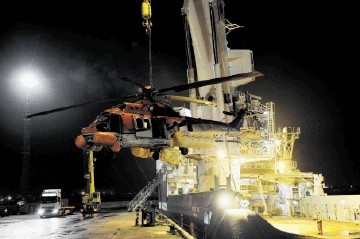
North Sea operators are coping, despite the reduced helicopter fleet. But the uncertainty over when normality might resume is a concern, says an industry leader.
The grounding of the Eurocopter-manufactured Super Puma EC225 fleet following the ditching of one off Fair Isle in October – which itself followed a similar incident in May – has created a massive challenge to the industry.
A week after the October incident Talisman and Total cancelled all non-essential work and Bristow, which has 11 EC225s in the UK, ordered new aircraft from Sikorsky.
However, Oil and Gas UK says companies have been managing – devising alternative ways to get workers to work and sharing flights. Impacts has been variable.
“There is virtually no impact in the Southern North Sea, West of Shetland and the Northern North Sea,” said Malcolm Webb, the body’s chief executive.
“The main impact seems to be focused on the Central North Sea, where the largest part of the 14,600 who work offshore are located.
“About 8,000 work in the Central North Sea, so we would expect the impact to be the largest there.”
He said the 14,600 figure was derived from Vantage POB system data from just before the EC225 Super Puma fleet was grounded.
The tally dropped to a low of 13,400 in November but rose to and plateaued at 14,000 by mid-December.
Helicopter passenger numbers at Aberdeen airport also fell in November, from 43,899 in November 2011 to 38,000 November 2012 – but the airport said this might not reflect the impact on flights and could have been affected by other issues.
In fact, passenger numbers in the year to the end of November had been higher year on year.
“On gross numbers the industry is coping very well,” said Webb. “Spare helicopter seats are being used and there is a fair amount of ingenuity – firms taking people by fixed wing aircraft to Scatsta to shuttle them out.
“Of course the 500-600 who are not getting offshore is a concern.”
However, he added: “But we do not have a great deal of granularity.”
While overall the reduction in staffing offshore is not huge, it is thought that some are worse off than others, potentially because they relied heavily on the grounded fleet. A recent snapshot survey sent to large and smaller operators, duty holders and rig operators backs up that thought.
While 13% said they had not been impacted at all, another 13% said they had felt a high impact. About 27% said the impact on their operations had been average with the rest saying the impact had been low-average or average to high.
What is not known is whether oil and gas production has been affected – in a year that is again expected to see a drop, estimated recently at 12% (following 2011’s 19% drop).
Webb thinks not. “We don’t see any impact on production levels.
“But the worrying thing isn’t yet an absolute end date for this.
“Eurocopter have not proved their (gearbox) hypothesis.”
He said he believes there may be an answer by February but even then there will likely remain a period of disruption running into months.
“The industry is hopeful we can get some news by February, but it would still potentially be late April/ early May until we are back up to speed.”
However, he said it is not just about the oil and gas operators – the health of the helicopter firms should be given thought too.
“There are 20 very expensive pieces of kit on the ground at the moment,” Webb said. “It is a very tough time for them at the moment.”
Chevron has been using a walk-to-work system it designed for use during heavy maintenance periods so additional staff could be based on an accommodation vessel moored alongside a production unit during summer. This has then become useful for crew transfer.
The industry also has a hotline and flight-sharing strategy in place, making use of any spare seats. A sub-inquiry was set up before Christmas to try and understand the situation further.
A spokesman for Oil and Gas UK said: “On the whole firms are coping. There is a lot going on behind the scenes to try and maximise the most efficient use of available helicopters and companies are doing different things – postponing non-essential trips, suspending non-essential work – and on the face of it the industry as a whole is coping.”